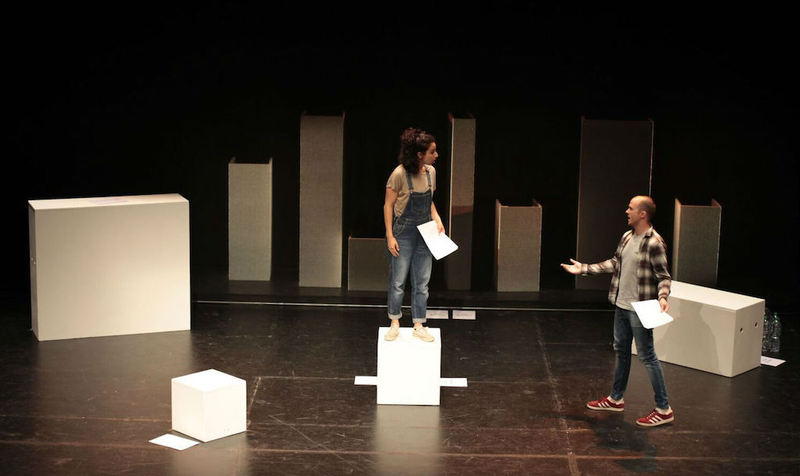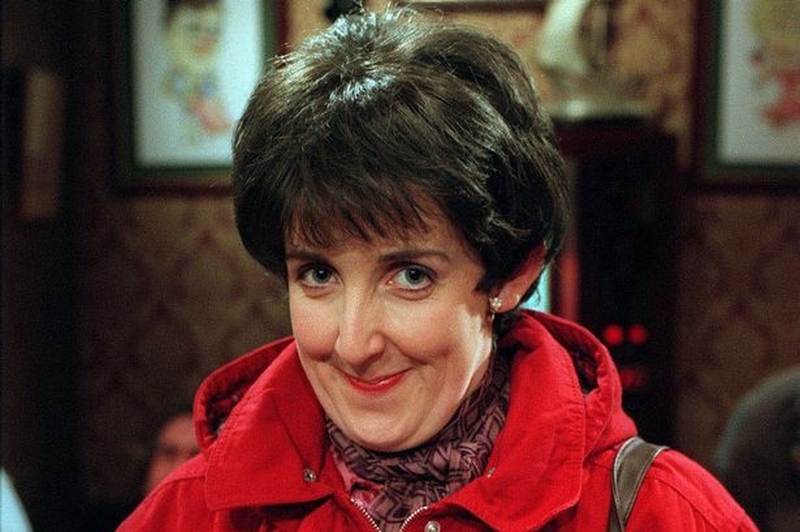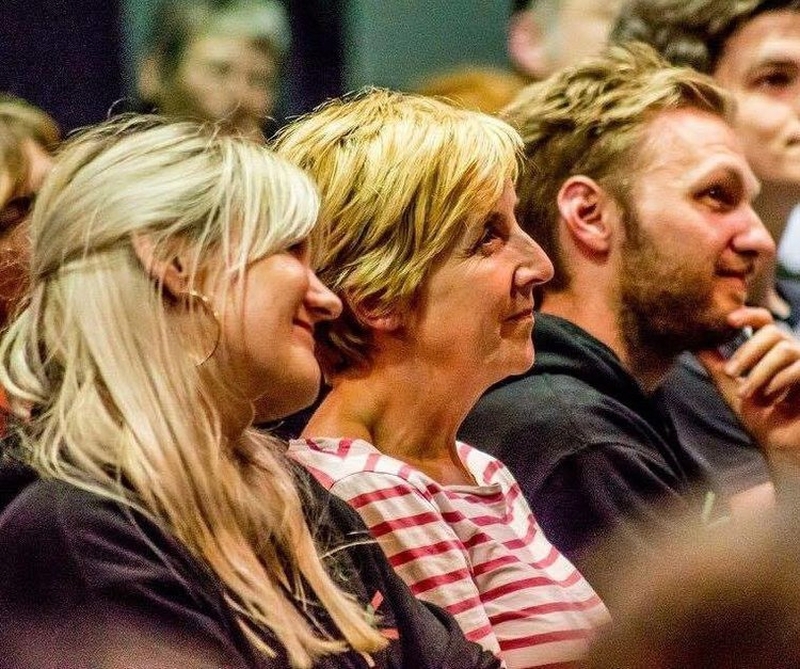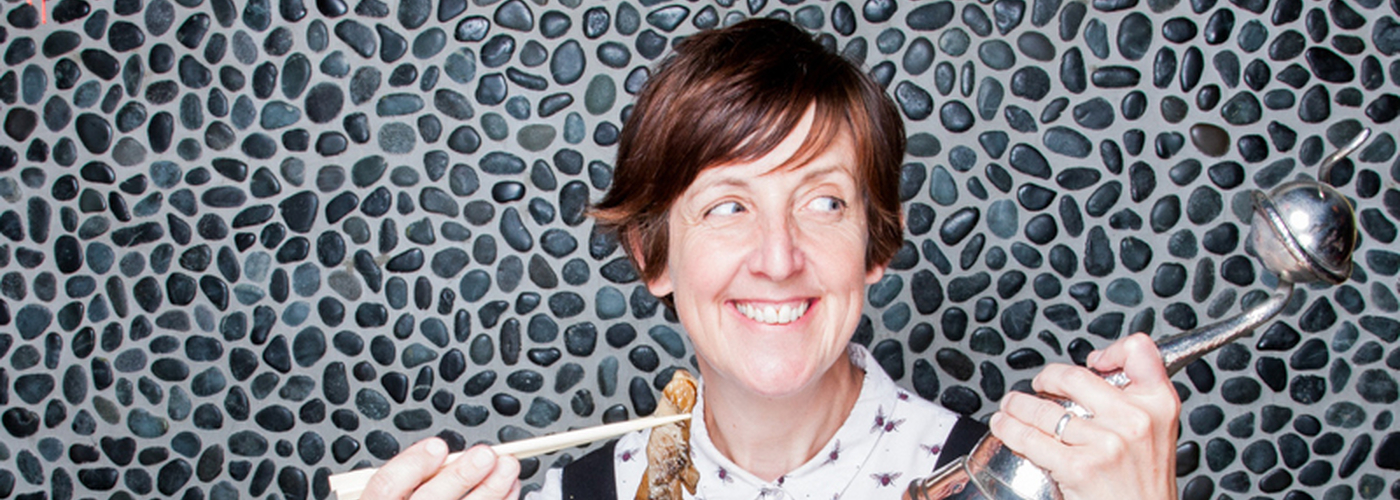The political theatre collective was co-founded by Hesmondhalgh in response to the 2015 Tory conference in Manchester
IN Take Back Theatre’s latest show, an innocent man is murdered in Piccadilly Gardens. Why? Because he was from Darfur, spoke Arabic and looked suspicious. This isn’t said directly but heavily implied by the two actors, who tell the story matter-of-factly, like witnesses at a police station.
Of course, it’s a fictional story - but it could well be true. Completed by writer Rebekah Harrison in the aftermath of the Manchester bombing, when racist hate crimes peaked, the play is a warning: not only against prejudice, but against supposition. The two storytellers repeatedly stray from fact into guesswork (something for which they chastise each other) and at first we wrongly assume the victim is a young mother, whose own mistaken assumption led to her becoming a murderer.
Actor Julie Hesmondhalgh co-founded Take Back Theatre ‘as an artistic response to the politics of austerity’
Poignantly, we learn what she supposed was a ‘weapon’ - about to her harm her son - was a selfie stick, that it was the victim’s last day in Manchester before he sought work in Birmingham, and that he carried a picture of his mum. The other people in Piccadilly Gardens when the incident happened - including a homeless man on spice and a girl who found out her boyfriend was cheating via Facebook - also reflected pertinent issues.
The play was deliberately simple, focusing on facts in a world of ‘embellished’ stories. As with other Take Back Theatre productions, it was also very political, aiming to open up discussion about pressing issues in society.

So that Julie Hesmondhalgh co-founded the company isn’t surprising. The actor and activist’s theatre credits span Black Roses: The Killing of Sophie Lancaster (a role she was offered by Lancaster’s mother) to The Almighty Sometimes (about the concerning rise of antidepressants in young people) and Blindsided (set in struggling Stockport under Thatcher reign).
God Bless the Child, meanwhile, condemned the government education system she finds so disappointing. “I know my daughters wouldn’t be able to follow the route I’ve taken, as a working class woman, these days. Arts have been pulled back, drama school fees have risen…there are so many things deterring young people from a career in the arts.”

Hesmondhalgh’s TV roles also veer towards the political. Her best known, of course, is Coronation Street’s Hayley Cropper: the first transgender character in a British soap opera, and the first permanent trans character in serialised drama when Hesmondhalgh took on the role in 1998. While originally intended as a temporary character, one of a series of disastrous dates for partner Roy, the general public quickly started rooting for the unlikely couple and Hayley became a permanent fixture for over fifteen years.
For Hesmondhalgh, ‘passionate about how drama can change the world,’ it was an apt turn of events. Determined for Hayley not to be a ‘joke role,’ she visited Frontline Books (a former radical bookshop in Manchester) and researched as much as possible about trans issues, subsequently winning many awards for her portrayal. She also tells us fondly that Annie Wallace - who advised on Hayley’s character - was inspired to go to drama school because of the role. As Sally St. Clare in Hollyoaks, Wallace is now the first trans person to play a regular trans role in British soap history.
There’s a lot of despondency at the moment, and people can feel isolated reading Twitter, watching the news...
Yet while attitudes are progressing, Hesmondhalgh concedes ‘there is still a long way to go.’ Although largely positive, last weekend’s Sparkle in the Park saw Amnesty campaigning for the release of detained activist Alejandra - just one example of trans people experiencing violence and abuse - and media representation is still poor, inspiring Hesmondhalgh to support Trans Media Watch: one of several charities for which she is patron.
Hesmondhalgh’s other regular TV roles include Cucumber (about 21st century gay life), Broadchurch (which explores the effect a child’s murder has on a small town) and fellow crime drama Happy Valley (a role she was offered by its writer and director Sally Wainwright). While Hesmondhalgh stresses she doesn’t have the power to choose roles at will - few actors have that - she tells us they do have to be in line with her beliefs.
And, it seems, with something to say. Which is why the activist and Labour supporter set up Take Back Theatre, a grassroots political theatre company, with writer Rebekah Harrison and visual artist Grant Archer.

Founded in response to the 2015 Tory conference in Manchester, the non-profit organisation has since covered everything from Trump to refugee camps and the aforementioned incident in Piccadilly Gardens.
Despite some accusations of preaching to the converted, Hesmondhalgh is proud of creating a community. “There’s a lot of despondency at the moment, and people can feel isolated reading Twitter, watching the news…we help people come together and realise we’re in this together.”
The non-profit company, which won a Manchester Theatre Award last year, also helps raise money for relevant charities - Hesmondhalgh herself is an avid fundraiser - and has been praised for its democratic use of both emerging and established talent, from Russell T Davies and James Graham to local writers and actors wanting a foot in the door. The main strand is rapid response script-in-hand productions but, when funding permits, Take Back also host bigger immersive installations that explore political issues in more depth. “With those, we can actually afford to pay the actors,” Hesmondhalgh laughs.
Take Back Theatre’s next show Take Back Our NHS is ‘a celebration of our wonderful NHS, a thank you to its workers and a call to arms to save it.’ Featuring fifteen pieces, from songs to monologues, it hits the Comedy Store on Tuesday 17 July.
As ever, Hesmondhalgh is currently involved in a flurry of different projects - from reading a refugee’s tale as part of Comma Press’ campaign to end indefinite detention, to performing her husband’s play at the Edinburgh Fringe - but it’s clear she always has time for Take Back Theatre: ‘bold, exciting, innovative work…that raises wider awareness, moves the conversation forward, inspires people into action and is ultimately full of hope.’
Main images: Elspeth Moore
















